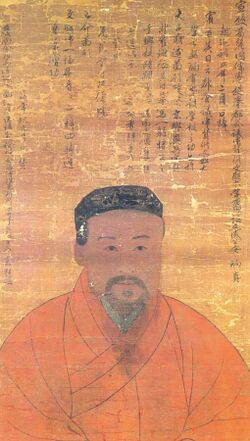Biography:An Hyang
From HandWiki
| An Hyang | |
 Portrait of An Hyang, held by Sosu Seowon, Yeongju, North Gyeongsang | |
| Korean name | |
|---|---|
| Hangul | 안향 |
| Hanja | 安珦 |
| Revised Romanization | An Hyang |
| McCune–Reischauer | An Hyang |
| Pen name | |
| Hangul | 회헌 |
| Hanja | 晦軒 |
| Revised Romanization | Hoeheon |
| McCune–Reischauer | Hoehŏn |
| Courtesy name | |
| Hangul | 사온 |
| Hanja | 士蘊 |
| Revised Romanization | Saon |
| McCune–Reischauer | Saon |
| Posthumous name | |
| Hangul | 문성 |
| Hanja | 文成 |
| Revised Romanization | Munseong |
| McCune–Reischauer | Munsŏng |
| Clan Origin | |
| Hangul | 순흥 |
| Hanja | 順興 |
| Revised Romanization | Sunheung |
| McCune–Reischauer | Sunhŭng |
An Hyang (1243–1306) also known as An Yu was a leading Confucian scholar born in Yeongju in present-day South Korea . He was from the Clan Ahn of Sunheung. He is considered the founder of Neo-Confucianism in Korea, introducing Song Confucianism to the Goryeo kingdom. An Hyang visited China , transcribing the works of Zhu Xi and bringing his copy and portraits of Confucius and Zhu Xi to Korea to use in his revitalization of Confucianism. He strove to replace Buddhism with Confucianism.
There is a portrait of him at the Sosu Seowon, which was built as a memorial to the scholar. There is also a statue of him on Banya-san in Nonsan.
References
- tourinfo.khu.ac.kr/iboard/bbsUpFiles/제%205호.hwp
- Grayson, James H. 2002 Korea - A Religious History. RoutledgeCurzon. ISBN:978-0-7007-1605-0.

